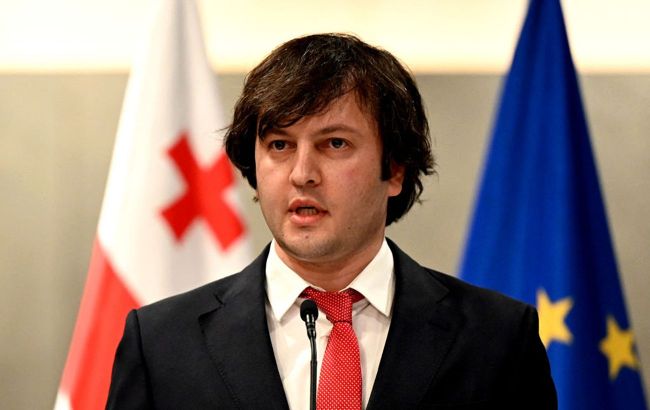Georgia protests: PM Kobakhidze signals EU readiness, criticizes disinformation campaign
 Georgia's Prime Minister, Irakli Kobakhidze (Photo: Getty Images)
Georgia's Prime Minister, Irakli Kobakhidze (Photo: Getty Images)
Amid ongoing protests, Georgian Prime Minister Irakli Kobakhidze expressed readiness to start negotiations on the country's EU membership "even today" if a decision is made in Brussels, according to Radio Liberty.
"We are not only continuing the process of European integration but are intensifying our efforts to ensure Georgia joins the European Union by 2030," he stated.
At the same time, Kobakhidze accused EU Ambassador to Georgia Pawel Herczynski of spreading "disinformation."
"Against this backdrop, it is shameful and alarming that the EU ambassador was involved in the disinformation campaign conducted by the radical opposition and affiliated NGOs and media," Kobakhidze remarked.
His statements follow criticism from European officials, who have pointed to anti-democratic actions by the Georgian government.
The Prime Minister dismissed these claims as unfair, asserting that the ruling party, Georgian Dream, initiated key steps toward European integration, such as signing the Association Agreement, establishing a free trade area, and obtaining visa-free travel.
He also accused opposition groups of "systematic violence," which he claimed is ignored by European partners.
Kobakhidze emphasized that Georgian authorities remain "committed to European integration" despite the criticism and pressure.
Background
On November 29, EU Ambassador to Georgia Pawel Herczynski publicly criticized Prime Minister Kobakhidze's announcement to postpone EU integration efforts until 2028, calling the decision "disheartening" and "regrettable." Herczynski stressed that the move contradicts the aspirations of most Georgians and the policies previously declared by Georgian authorities.
The announcement came just as mass protests erupted in Georgia. These were sparked by the ruling Georgian Dream party’s decision to reject EU budgetary grants and delay negotiations on membership until the end of 2028.
Despite this, the government continues to claim that its goal is to join the EU by 2030. Protesters accuse the government of effectively blocking European integration and are demanding early parliamentary elections.
Between November 28 and December 1, police dispersed demonstrations on Rustaveli Avenue in Tbilisi three times, using force and special equipment. Hundreds of people were detained, and reports emerged of assaults on protesters and journalists.
Today, authorities confirmed the detention of an opposition leader and several journalists. The Ministry of Internal Affairs explained the actions of law enforcement as a response to violence by protesters. However, human rights organizations and the ombudsman stated that violence was also used against peaceful demonstrators.
On the morning of December 2, law enforcement officers detained citizens heading to work near the protest sites.
Meanwhile, the EU has effectively announced a halt to Georgia's membership bid. The decision reflects not only the government's policy shift but also restrictions on civil rights.

